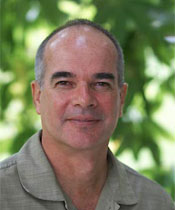Thursdays, 4:30–5:30 pm
6 January–10 March 2011
School of Aquatic & Fishery Sciences
102 Fishery Sciences (auditorium)
1122 NE Boat Street (map)
University of Washington
Reception follows each talk
For more information, contact:
Trevor Branch, 206-221-0776
tbranch@u.washington.edu
courses.washington.edu/susfish
Funding for the Series is generously
provided by Tanya Bevan, friends of Don
Bevan, the UW School of Aquatic and
Fishery Sciences, and NOAA's Alaska
Fisheries Science Center and
Northwest Fisheries Science Center.
Ocean Acidification: Effects on Fisheries and Oceans
Note Date Change
Tuesday, 22 Feb

Philip Munday
Professor, ARC Centre of Excellence for Coral Reef Studies, School of Marine and Tropical Biology, James Cook University, Australia
Behavioral and Ecological Consequences of Acidification on Fish
Abstract
The likely effects of ocean acidification on non-calcifying species, such as fish, is still poorly understood. In general, fishes are thought to be relatively tolerant to increased CO2 and reduced pH because they have well developed physiological mechanisms for pH compensation. Adults of some marine fishes can tolerate increased CO2 concentrations several orders of magnitude greater than predicted to occur under climate change scenarios. However, one recent study found that the scope for aerobic activity in two species of tropical reef fishes decreased by up to 30% when they were exposed to ~1000ppm CO2. This is consistent with hypotheses about the physiological mechanisms by which ocean acidification will affect water-breathing animals. The extent to which changes in aerobic function will affect the ecology of marine fishes is currently unknown. The few studies that have investigated the effects of ocean acidification in marine fishes have found no evidence for negative impacts on basic life history traits. Fertilization rates, hatching success, growth, development and swimming ability do not appear to be significantly affected by levels of CO2 that could occur by the end of this century. In contrast, several recent papers have reported dramatic effects of elevated CO2 on the sensory ability and behavior of reef fish larvae, with significant implications for population replenishment. Larval fish reared in control seawater discriminated between a range of cues that could help them locate suitable settlement habitat and avoid predators. This discriminatory ability was impaired in larvae reared in conditions simulating ocean acidification. Larvae exposed to elevated CO2 were more active and exhibited riskier behavior. As a result, they had markedly higher mortality from predation in natural habitat compared with current-day controls. Changes to larval behavior and impairment of their sensory systems could have significant effects on population replenishment and connectivity patterns of marine species.
Bio
Professor Philip Munday has broad interests in the biology and ecology of marine fishes. Much of his research has explored the role of habitat in structuring reef fish communities, from the scale of individual coral colonies up to regional scale comparisons of habitat use. His current research program focuses on understanding and predicting the impacts of climate change on populations and communities of coral reef fishes, both directly through changes in the physical environment and indirectly through effects on coral reef habitat. Using a range of laboratory and field experiments he is investigating the effects of increased temperature and ocean acidification on reef fish populations and testing their capacity for acclimation and adaptation to a rapidly changing environment. He has published 90 papers in coral reef ecology, including >20 primary research papers and major reviews on the impacts of climate change. His other major research interest is the ecology and evolution of reproductive behaviour in fishes. Philip is an Australian Research Council QEII Fellow and Professorial Research Fellow at James Cook University in Australia.
Readings
- Munday P.L., Dixson D.L., McCormick M.I., Meekan M., Ferrari M.C.O., Chivers D.P. (2010). Replenishment of fish populations is threatened by ocean acidification. Proceedings of the National Academy of Sciences USA, 107: 12930-12934.
- Munday, P.L., Dixson, D.L., Donelson, J.M., Jones, G.P., Pratchett, M.S., Devitsina, G.V. and Døving, K.B. (2009). Ocean acidification impairs olfactory discrimination and homing ability of a marine fish. Proceedings of the National Academy of Sciences USA, 106: 1848-1852.
- Munday P.L., Crawley, N. and Nilsson G.E. (2009). Interacting effects of elevated temperature and ocean acidification on the aerobic performance of coral reef fishes. Marine Ecology Progress Series, 388: 235-242.
- Portner HO, Farrell AP (2008) Physiology and climate change. Science 322: 690-692.